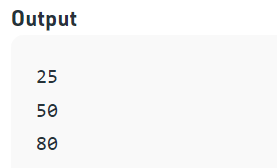Default arguments and virtual function
If the calling function fails to supply a value for the argument, the compiler will automatically assign the value specified in the default argument provided in the function declaration. The default value is overridden if any value is passed.
Here is a straightforward C++ example to show how default arguments can be used. Because only one function uses the default values for the third and fourth inputs, we don't need to construct three sum functions in this case.
Example

What are the key points of default arguments?
- Since default parameters can be adjusted if necessary, they vary from constant arguments, which cannot be altered.
- When the caller function supplies values for them, the default parameters are replaced. The importance of z and w are replaced with 25 and 30, respectively, when the function sum(10, 15, 25, 30) is called.
- When a function is called, the arguments are transferred in the direction of movement from left to right from the caller function to the called process. Because just the default value of w is utilized, sum(10, 15, 25) will assign the values 10, 15, and 25 to x, y, and z, respectively.
- Once a default value is specified in the function declaration for an argument, the default value must be applied for all ensuing arguments. The assignment of the default arguments is from right to left. It can also be said. The following function declaration, for instance, is incorrect since the subsequent argument to the default variable z is not default.

What are the advantages of default arguments?
- When expanding the functionality of an existing function, default arguments are helpful since we may do so by simply adding a new default argument to the function.
- It offers a straightforward and efficient method of programming.
- It aids in making programs smaller.
- Default arguments increase a program's consistency.
What are the disadvantages of default arguments?
- The compiler must substitute the function call's omitted arguments with their default values, which lengthens the execution time.
What is a virtual function?
A virtual function is a member function that is defined in a base class and redefined (overridden) by a derived class. A virtual function for that object may be called, and the derived class's version of the function may be executed when you refer to an object of a derived class using a pointer or a reference to the base class.
- No matter what kind of reference (or pointer) is used to invoke a function, virtual functions make sure the right function is called for an object.
- their primary use is to implement runtime polymorphism.
- In base classes, functions are declared using the virtual keyword.
- Runtime resolution of function calls is carried out.
What are the rules of virtual function?
- They are always specified in the base class and replaced in derived classes. The function from the base class is used if the derived class does not override or redefine the virtual function, which is optional.
- Virtual functions should have the same prototype in both the base class and any derivations.
- Virtual constructors are not permitted in classes, although virtual destructors are allowed.
- To accomplish runtime polymorphism, virtual functions should be accessible via base class type pointers or references.
- Static operations cannot be virtual.
- One type of friend function for another class is a virtual function.
Can virtual functions have default arguments?
Virtual functions are no different from conventional functions because they might take default arguments (see 6.5.1, p. 236). When a function is called with a default parameter, the static type's definition of that argument is utilized as its value.
In other words, the default argument(s) will be those stated in the base class when a call is made through a reference or pointer to the base. Even when the derived version of the function is called, the base-class arguments will still be utilized. In this scenario, the default arguments specified for the base-class version of the function will be provided to the derived function. The program won't run as intended if the derived function requires different arguments to be supplied to it.
|


 For Videos Join Our Youtube Channel: Join Now
For Videos Join Our Youtube Channel: Join Now










